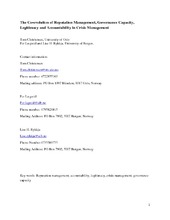| dc.contributor.author | Christensen, Tom | |
| dc.contributor.author | Lægreid, Per | |
| dc.contributor.author | Rykkja, Lise H. | |
| dc.contributor.editor | Gephart, Robert P. Jr | |
| dc.contributor.editor | Miller, C. Chet | |
| dc.contributor.editor | Helgesson, Karin Svedberg | |
| dc.date.accessioned | 2020-08-04T11:45:09Z | |
| dc.date.available | 2020-08-04T11:45:09Z | |
| dc.date.issued | 2019 | |
| dc.Published | Christensen T, Lægreid P, Rykkja L: The Co-evolution of Reputation Management, Governance Capacity, Legitimacy and Accountability in Crisis Managment. In: Gephart, Miller, Helgesson. The Routledge Companion to Risk, Crisis and Emergency Managment, 2019. Routledge p. 177-191 | eng |
| dc.identifier.uri | https://hdl.handle.net/1956/23403 | |
| dc.description.abstract | Dealing with crises is a main responsibility of government authorities. Crises strike at the core of democratic governance and challenge not only capacity but also legitimacy and accountability. They are a test of whether an organization can meet citizens’ expectations. Crisis management studies often focus on governance capacity, investigating how the government can effectively prepare for, handle and learn from different crises. One way to do this is to study how governments structure their organizations responsible for crisis and how they use their overall capacity and resources (Christensen, Lægreid, & Rykkja, 2016). | en_US |
| dc.language.iso | eng | eng |
| dc.publisher | Routledge | eng |
| dc.title | The Co-evolution of Reputation Management, Governance Capacity, Legitimacy and Accountability in Crisis Managment | eng |
| dc.type | Chapter | en_US |
| dc.type | Peer reviewed | en_US |
| dc.date.updated | 2020-01-10T11:43:46Z | |
| dc.description.version | acceptedVersion | |
| dc.rights.holder | Copyright 2018 Routledge | en_US |
| dc.identifier.doi | https://doi.org/10.4324/9781315458175 | |
| dc.identifier.cristin | 1704659 | |
